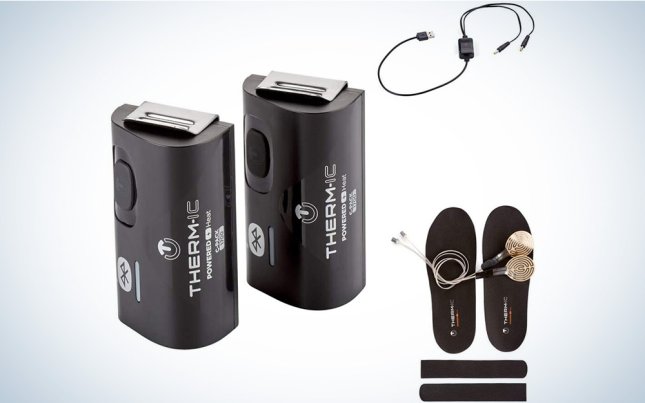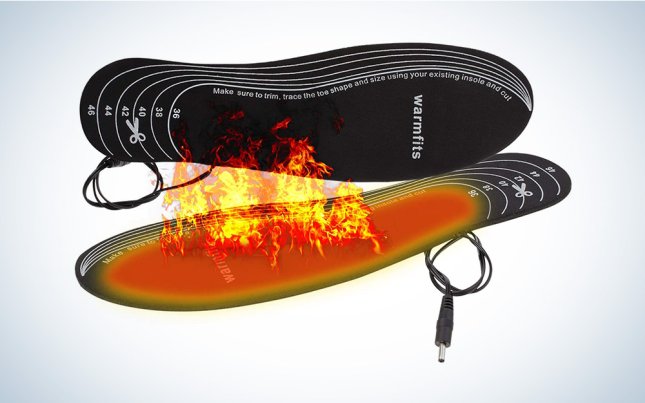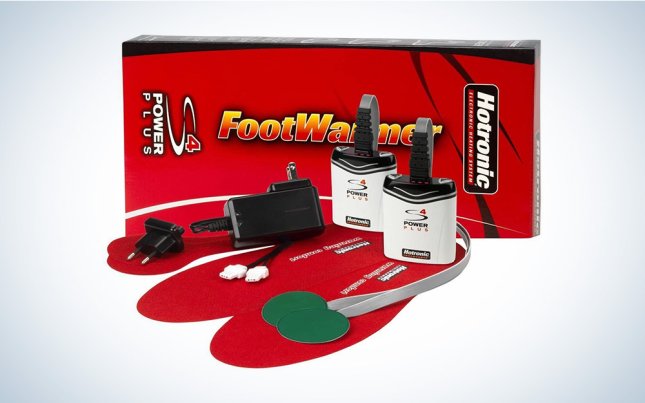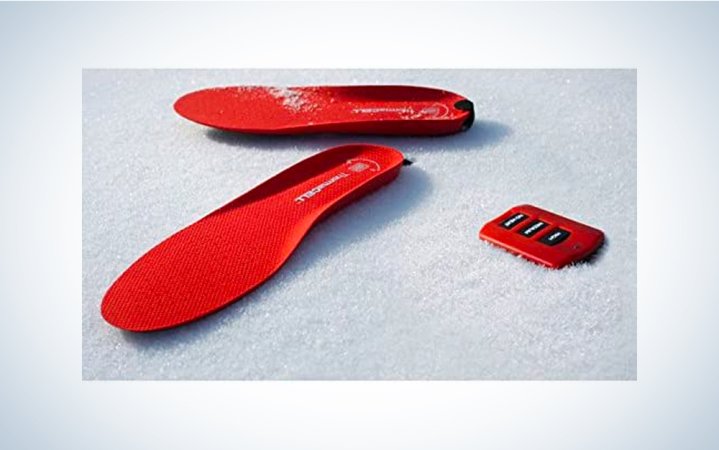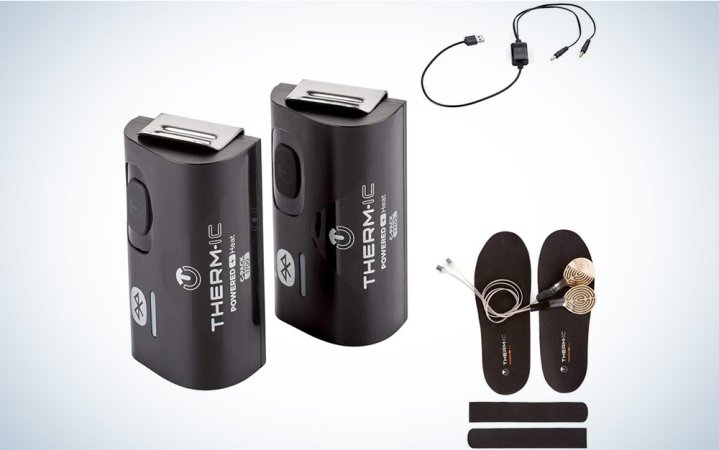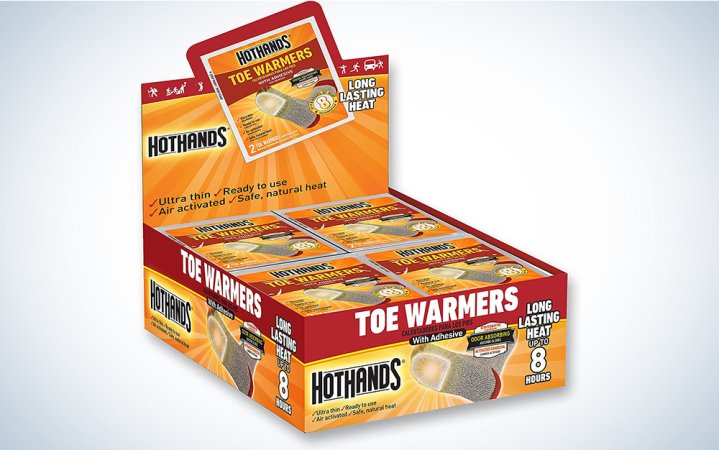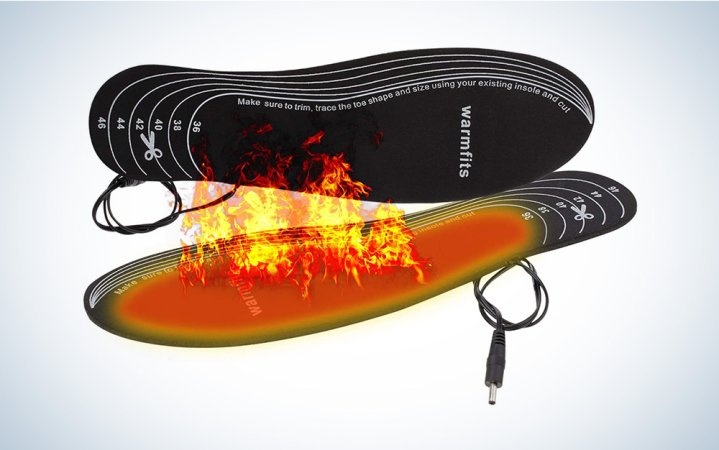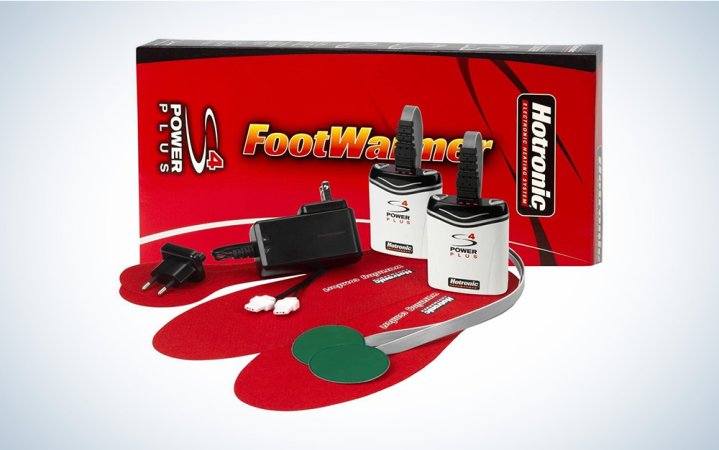We may earn revenue from the products available on this page and participate in affiliate programs. Learn more ›
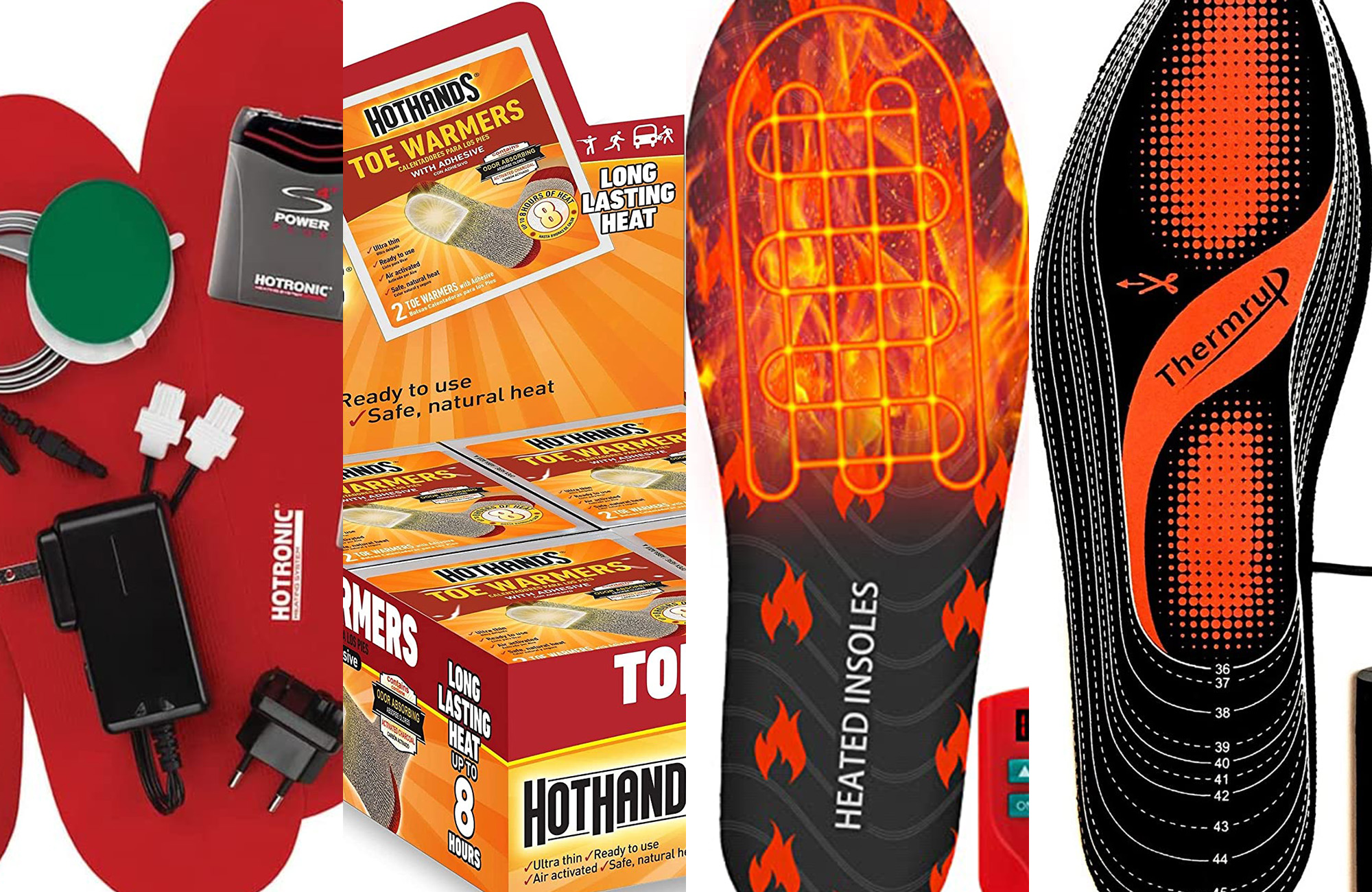
There’s nothing worse than heading home early from what should be a great snow day because all the heat has left your toes or having a tough time focusing at work because all you can think about is the cold creeping into your insoles. You might be dreaming of the space heater waiting for you at home, but you need a solution now. Heated insoles can quickly and comfortably take out any unwelcome chills that come your way. These impressively compact creations can be found in various sizes and suited to various activities. Some heated shoe insoles are disposable, some are powered by rechargeable batteries, and some are even water-resistant (we’re looking at you fellow frequent foot-sweaters). Plus, most models are designed to minimize bulk or extra padding, so you won’t have to worry about your toes being squished. The best heated insoles are a great way to stay warm and stay active even when the temperature starts to drop.
- Best overall: Thermacell Original Heated Insoles
- Best for ski boots: Thermic C-Pack Set
- Best high-temperature: Riomza Rechargeable Heated Insoles
- Best toe warmers: HotHands Heat Max Toe Warmers
- Easiest to trim: Thermrup Electric Heated Insole Foot Warmers
- Best customizable: Hotronic S4+ Universal Foot Warmer
- Best budget: HotHands Insole Foot Warmers
How we chose the best heated insoles
We’ve reviewed plenty of heated tech, but we’re practically experts in the realm of electric clothes. We looked at critical reviews, user recommendations, performed personal testing, and conducted heavy research to back our findings. The scientific method! It’s great!
The best heated insoles: Reviews & Recommendations
Heated shoe inserts are safe and easy to use; as long as you follow all included directions, you don’t need to worry about any damage to your skin, socks, or shoes. This makes them the perfect companion for many shoe types, including ski boots, hiking shoes, running sneakers, and more. Any one of our picks will be sure to toast up those tootsies.
Best overall: Thermacell Original Heated Insoles
Pros
- Remote control
- Shock absorbent
- Retains it shape well
Cons
- Can accidentally control a different pair of heated insoles with universal remote
Why it made the cut: These bright red insoles have a matching remote so you can control the temperature and turn it on and off without bending over or taking off your shoes.
Specs
- Weight: .75 lbs.
- Material: Polyurethane
- Power source: Battery powered
- Heat range: 100°F-111°F
Although Thermacell is known for its mosquito-repelling tech, they aren’t a one-trick pony with these battery-operated inserts. The wireless, remote-controlled insoles can heat between 100°F-111°F—there’s also a No Heat setting in case you end up indoors. Polyurethane foam allows for even heat conduction and shock resistance for comfortable wear all day. No more cold feet this winter—just ensure you stay far enough from someone else wearing these insoles, as you can control their pair thanks to the universal remote.
Best for ski boots: Thermic C-Pack Set
Suitable for the Slopes
Pros
- Bluetooth enabled to control from phone
- Can use with existing insoles
- Ultra-fine heat elements for comfort
Cons
- Expensive
Why it made the cut: These long-lasting heated insoles provide 17 hours of heat for warm feet all day on the slopes.
Specs
- Weight: .75 lbs.
- Material: Polyurethane
- Power source: Battery powered
- Heat range: Unknown
This set from Thermic are the best heated insoles for ski boots on the market. The batteries provide up to 17 hours of heat, perfect for overnight trips, and they can fit underneath the strap of your ski boot to increase your mobility and keep you comfortable. There are three heat settings—low, medium, and high—that you can control via Bluetooth from your phone. Plus, the heating element can be used with your existing insoles or arch supports without issue. If this high-end model’s price point isn’t right for you, Thermic has many other options for you to peruse.
Best high-temperature: Riomza Rechargeable Heated Insoles
Hot, Hot, Hot
Pros
- Trimmable
- Comes with a wireless remote control with LED display
- Quickly heats up
Cons
- Heels thick to fit battery
Why it made the cut: These inserts reach up to 150°F—as Paris Hilton would say, “That’s hot!”
Specs
- Weight: .75 lbs.
- Material: Carbon fiber
- Power source: Battery powered
- Heat range: 104°F-150°F
These heated shoe insoles have three different temperature settings easily controlled with an included remote. The highest setting can reach up to 150 degrees Fahrenheit. They come in three sizes that are easily trimmable to fit your shoe. Perhaps best of all, the battery for these guys sits inside the heel, so you don’t need to worry about strapping it elsewhere on your body—perfect for work or hunting—though this does tend to add a tiny bit of weight.
Best toe warmers: HotHands Heat Max Toe Warmers
Toe-tally Toasty
Pros
- Thin
- Odor-absorbing
- Ingredients don’t hurt the environment
Cons
- You’re bound to come across a dud pair of warmers
- Can’t control temperature
Why it made the cut: These single-use toe warmers stop stinky feet and are perfect to throw in your car for warm feet at a hands’ reach.
Specs
- Weight: Entire package is 2.2 lbs.
- Material: Iron powder, water, salt, activated charcoal, and wood fiber
- Power source: Air-activated
- Heat range: 100°F-115°F
These toe warmers from HotHands are our go-to when we need a little bit of extra insulation in our shoes. All you need to do is remove them from the pack and shake them for up to eight hours of heat. They are super thin so that you won’t feel any extra bulk, and they contain odor-absorbing activated charcoal, so if you do start to sweat, you won’t notice any stink.
Easiest to trim: Thermrup Electric Heated Insole Foot Warmers
Up to four hours of heat.
Pros
- Comfortable
- Washable
- Even heat distribution
Cons
- Short battery life compared to other insoles on our list
Why it made the cut: Get insoles for the whole family—with peace of mind that they’ll fit—with these lightweight, battery-operated inserts.
Specs
- Weight: .62 lbs.
- Material: Nylon, EVA foam
- Power source: Battery powered
- Heat range: Unknown
These heated insoles from Warmfits can last for up to four hours. The included cable connects to the battery, which can be charged using rechargeable batteries. Plus, you can cut the soles to fit your shoes and relax, knowing they’re made from comfortable EVA foam.
Best customizable: Hotronic S4+ Universal Foot Warmer
Custom Comfort
Pros
- Last up to 21 hours, depending on heat setting
- Switch design prevents accidental turn-off
- Wiring is thin and not noticeable
Cons
- Expensive
Why it made the cut: Get the perfect fit with these insoles that can last you from 2.5-25 hours.
Specs
- Weight: 1 lb.
- Material: Polyurethane
- Power source: Battery powered
- Heat range: Uknown
These heated insoles for shoes from Hotronic are all you need for custom heat. Though it does include insoles, it also has two separate heating elements that can attach to the toe of your own orthotic, with four heat settings. The batteries can last up to 21 hours, depending on the heat output, in cold climates with temperatures that can get as low as -20 degrees Fahrenheit.
Best budget: HotHands Insole Foot Warmers
Use and Lose
Pros
- Long-lasting
- Won’t budge
- Natural heat
Cons
- You’re bound to come across a dud pair of warmers
- Can’t control temperature
Why it made the cut: These feet warmers stick to the bottom of your socked feet and are cheap—and easy—to keep around.
Specs
- Weight: Entire package is 2 lbs.
- Material: Iron powder, water, salt, and wood fiber
- Power source: Air-activated
- Heat range: 100°F-115°F
HotHands heated insoles are air-activated, safely made, and can last for up to nine hours. They’re great for winter sports and outdoor activities like tailgating, yard work, dog walks, and more.
What to consider when buying the best heated insoles
To find the best heated insoles for you, think about how often you’ll be using them, what kinds of outdoor activities you’ll be doing, and the temperatures you’re expecting. Do you need something that will last for hours, or do you want to prioritize heat settings? Do you already wear shoe supports and need something customizable? Are you looking for something disposable and budget-friendly? We’ve created this guide to help you answer those questions and get one step closer to warm feet.
Need the perfect boot warmer for your ski trip?
Perhaps the most popular reason for purchasing heated insoles is skiing. Using a heated insole can extend your time on the mountain by preventing pain and cramping caused by the cold.
If you’re looking for a warming insole to slip inside your ski boot, ensure you get one that you can customize to fit the room inside the boot, particularly around the toe box. You’ll also want a boot warmer that will last more than a couple of runs; if you’re looking for a full day of skiing, go for a unit that has at least five to six hours of battery life. We also recommend grabbing an insole with a water-resistant battery pack. Even though your feet are likely protected from the snow by your ski pants, there is still a chance moisture will sneak in; waterproof or resistant insoles will prevent damage over time, as well as keep you safe.
If you’re entirely new to rechargeable insoles, you should know that most models come with an external battery that can attach to your shoe or be placed in a pack to wrap around your leg or ankle. They require a set of wires to plug the insole into the battery. If you’re using a heated insole for skiing, make sure you select a pair with super durable wires that won’t stretch or snap if you take a tumble. Of course, when you go inside, you can change into your heated slippers to keep your feet warm and cozy.
Will you be outside in below-freezing temperatures?
Maybe you aren’t a winter sports fanatic, and you need something for everyday use because you live in a freezing locale. If this is the case, the most important thing to consider is the included heat settings.
Many heated insoles will come with a few heat levels; some need to be manually set; others can be controlled via remote. Remember, when you use the highest heat setting on any insole, you will decrease the battery life faster than a cooler heat setting. You’ll still be able to squeeze out a couple of hours with consistent heat, but you might not be able to make it through a winter trek before the battery dies. It’s a good idea to take the insoles out for a little test drive before committing to more prolonged activities like hikes or an errand marathon. That way, you can figure out which setting is right for you, keeping your feet warm, not sweaty. However, it’s recommended you wear socks with your heated insoles to absorb any potential sweat.
Are you constantly scrunching up your toes to get the blood flowing?
While evenly dispersed heat is never a bad thing, some people need to target specific areas in order to get the relief they need. Just like your fingers get chilly before your palms, your toes are usually the first part of your feet to feel the effects of extreme cold. How many times have you found yourself standing outside desperately wiggling your toes, scrunching them up, or jumping up and down just to try and feel them again? If this sounds like you, and you have good circulation elsewhere, maybe all you need is a set of really great toe warmers.
Toe warmers are significantly smaller than insoles, making them a little more susceptible to moving around or getting scrunched up in the shoe; they also have a bit more trouble connecting to a battery via wires (which are connected to the heel in most insoles). This is why we actually recommend sticking to a disposable, adhesive toe warmer. You’ll get the heat you need, for an extended period of time, without breaking the bank or struggling to flatten them out at the end of the day.
What are the best heated insoles that will last for hours on camping our hunting trips?
Some winter activities require you to be outside in the cold for long periods of time. Hunting, camping, and trekking can leave you feeling frozen, especially if you haven’t prepared properly. Similar to prioritizing heat over longevity, if you need the maximum amount of battery life out of your heated insoles, you might need to sacrifice the highest temperatures or a variety of temperature settings. However, not having tons of levels to choose from means more concentrated, evenly dispersed heat that won’t get cooler with each passing hour as the battery’s energy fades.
You can also look for extra features to keep your heated insoles lasting longer. The best heated insoles for long days will include batteries you can charge in the car. This means you can charge on the way to your trip or activity while also keeping the option open for a quick boost.
Do you want to stay warm but keep your current insoles?
Orthotics and insoles are extremely common and used by people of all ages to support their arches, relieve strain, cushion calluses, and minimize symptoms of tendinitis. More serious conditions are often treated with custom-molded insoles prescribed by podiatrists. If you already have insoles you love, but find yourself needing a little bit of extra warmth, there are options out there.
Some heated insoles come in a pack, and some sell their parts separately. This is great for folks who have orthotics but need a heating element. The packs will instruct you where to place the protected element on your insole, typically on the toe area, and how to connect all necessary cables or wires. You generally won’t need to do anything else; any individual heating element will be safe for you to use without adding anything extra. However, do not try to remove the heating element embedded in traditional heated insoles; this could be dangerous and result in injury. If you tend to get cold easily, you should also check a pair of heated hand warmers or heated gloves.
Best budget heated insoles
You don’t need to spend a ton of money on heated insoles, especially if you only need them a few days out of the year. You can easily address frigid feet for well under $45. Disposable foot warmers work great and are a better fit for tighter budgets. Most of them just need a quick shake to combine the chemicals inside before you adhere them to the bottom of your shoe. Disposable insoles have a three- to four-year shelf life, so you don’t have to use them right away. This makes them great for a couple of winter vacations.
FAQs
Whether rechargeable or single-use, the best heated insoles can cost between $20-$200.
As a general rule, you don’t want to submerge any batteries in water. We don’t recommend buying heated insoles if you suspect your feet will be soaked by the end of the day. However, some models are water-resistant and work well to wick away sweat and other droplets. To be safe, never assume something is waterproof unless specifically stated.
Yes, so long as your children can verbally express discomfort. Heated insoles are totally safe, but you want to make sure your child can tell you if they start to feel too hot. Look for an insole that says it’s specifically for kids to ensure the right fit and rest easy with the knowledge that all necessary safety precautions have been taken when it comes to the design.
If your toes are always cold, it is probably worth it to invest in a reliable model that will last. More expensive models typically have better batteries, consistent heat regulation, a more comfortable design, and longer life overall. If you only use foot warmers every so often, or you’re just looking for something to add a touch of heat, you won’t necessarily need to invest in an insole for the long term.
Applying a warm compress is a great way to treat foot pain, so heated insoles are a sound swap. Consult with your doctor or physical therapist before slipping some heated insoles into your shoes for medical purposes.
Final thoughts on the best heated insoles
- Best overall: Thermacell Original Heated Insoles
- Best for ski boots: Thermic C-Pack Set
- Best high-temperature: Riomza Rechargeable Heated Insoles
- Best toe warmers: HotHands Heat Max Toe Warmers
- Easiest to trim: Thermrup Electric Heated Insole Foot Warmers
- Best customizable: Hotronic S4+ Universal Foot Warmer
- Best budget: HotHands Insole Foot Warmers
The best heated insoles are going to keep your feet warm so you can enjoy your favorite winter activities. From rechargeable to disposable, these foot warmers are a great way to relieve any pain or discomfort you feel during the coldest time of the year. Consider how much time you’ll be spending outside, how much extra heat you need, and what you’ll be doing while wearing your new foot warmers. Once you can answer these questions, you’ll be ready to purchase a great pair of heated insoles.
